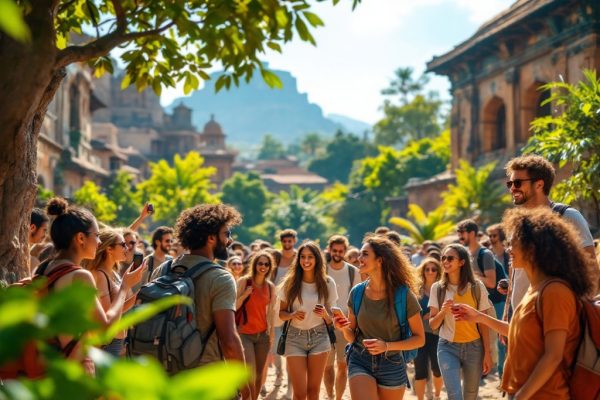How to Prepare for Studying Abroad
Ready for a life-changing adventure? Studying abroad offers incredible personal and academic growth, but careful planning is key. This guide provides essential steps, from visa applications and securing accommodation to managing finances and embracing cultural immersion. Learn how to navigate the process, minimize culture shock, and maximize your study abroad experience. Start your journey now and unlock a world of opportunities!
Important information

- Research your host country’s culture, laws, and customs to minimize culture shock and avoid legal trouble. Learn basic local phrases to improve daily interactions.
- Secure the correct visa and passport, gather academic documents like transcripts, and arrange finances including exploring scholarships and grants.
- Prioritize your health by consulting your doctor, getting necessary vaccinations, and securing appropriate health insurance. Pack light with versatile clothing and essential toiletries.
- Book flights and accommodation in advance to secure the best deals. Consider host families, student halls, or private apartments depending on your needs and budget.
- Set clear personal and academic goals for your study abroad experience to maximize its benefits, such as language acquisition or cultural immersion.
Research Host Country
Planning a study abroad adventure requires thorough research. Understanding your host country’s history, traditions, and cultural nuances will significantly ease your transition and minimize potential culture shock. Familiarizing yourself with local laws and customs can also prevent unforeseen difficulties.
Cultural Understanding
Researching cultural values and traditions is crucial for a successful study abroad experience. This includes understanding social etiquette, communication styles, and potential taboos, which will help you integrate more smoothly into the local community. Connecting with local students and attending cultural events can further enhance your cultural understanding.
Practical Preparation
Thorough practical preparation is also essential. This includes researching visa requirements, health insurance, accommodation options, and local transportation. Learning basic phrases in the local language can also be incredibly helpful for daily interactions. By addressing these practical aspects, you can ensure a smoother and more enjoyable experience.
Learn About Local Laws and Etiquette
Respecting local laws and customs is essential for a smooth and enjoyable travel experience. This not only helps you avoid legal issues but also demonstrates cultural sensitivity, fostering positive interactions with locals. For instance, researching dress codes, social greetings, and dining etiquette can make a positive impression and show respect for the local culture. Additionally, understanding transportation laws, including rules of the road and traffic regulations, is crucial for safe travels. Familiarizing yourself with local driving customs can also prevent misunderstandings and ensure a safer journey.
Understand Cultural Norms and Adaptation
Planning to study abroad? Cultural adaptation is key to a rewarding experience. Research your host country’s customs and traditions. Understanding social norms is crucial. Learning basic local phrases can connect you with people. Engage with locals, participate in cultural events, and broaden your understanding. Be open-minded and flexible to enhance your experience.
Research your host country. Delve into its customs and traditions.
Grasp social norms. This will help you navigate social situations appropriately.
Learn basic local phrases. Even a few words can build rapport and show respect.
Engage with locals. Participate in cultural events to deepen your understanding.
Cultivate open-mindedness and flexibility. This will make your adjustment smoother and more enjoyable.
Prepare for Culture Shock
Preparing for a study abroad experience can minimize culture shock. Researching your host country’s traditions and values is a great starting point. Learning even a few basic phrases in the local language can also be incredibly helpful. Connecting with local students and participating in cultural events will further enhance your understanding. Above all, flexibility and open-mindedness are key to adapting to your new environment. This process, while requiring time, is incredibly rewarding.
Research your host country. Learn about the traditions, values, and customs of the place you’ll be calling home for a while.
Learn basic phrases. Even a few simple greetings or phrases in the local language can go a long way in showing respect and building connections.
Connect with local students. They can offer invaluable insights into the culture and help you navigate daily life in a new environment.
Participate in cultural events. Embrace the opportunity to experience local festivals, traditions, and celebrations firsthand.
Be flexible and open-minded. Adapting to a new culture takes time and patience. Embrace the unexpected and be open to new ways of doing things.
Understand Visa and Documentation Requirements
Preparing to study abroad involves several key steps. First, verify your eligibility and ensure you meet all the requirements of your chosen destination. Second, secure a valid passport and the necessary student visa. Third, gather essential academic documents, such as transcripts and enrollment verification. Fourth, compile your financial paperwork. Fifth, confirm whether your host country requires a language proficiency certificate and obtain one if necessary. Finally, contact the embassy or consulate of your destination country for the most current visa information and begin your application process early.
Eligibility and Requirements
Verify your eligibility and ensure you fulfill all the requirements of your chosen destination, including a valid passport and student visa.
Academic and Financial Documentation
Collect essential academic documents, such as transcripts and enrollment verification, and compile all necessary financial paperwork.
Language Proficiency
Confirm language proficiency requirements with your host institution and obtain the necessary certificate if needed.
Visa Application
Contact the embassy or consulate for up-to-date visa information and begin your application process early to avoid delays.
Prepare Your Visa and Passport
Ensure your passport’s validity extends six months beyond your planned return date.
Apply for a student visa well in advance.
Carefully follow the specific regulations of your host country.
Gather all essential documents, including your acceptance letter, financial statements, and academic transcripts.
Make copies of these documents and any other important paperwork.
Know the Student Visa Application Process
Complete the application form and gather essential documents such as your passport, acceptance letter, proof of finances, and academic transcripts.
Anticipate an interview at the embassy or consulate.
Some countries may also require biometric data or a police clearance certificate.
Processing times vary depending on the country.
Gather Academic Transcripts and Enrollment Verification
Obtain your official university transcripts and enrollment verification. Contact your university’s registrar for transcript request procedures.
Order these documents early, as processing can take time.
Enrollment verification, confirming your current student status, can also be obtained from your university. These documents are essential for both visa applications and university admissions abroad.
Enhance Language Skills
Learning some of the local language before your trip is highly recommended.
Language learning apps are a great complement to formal classes, helping you boost your skills quickly.
Practicing with native speakers is invaluable, whether it’s through conversation exchanges or finding a language partner.
Immersing yourself in local media, such as books, podcasts, and films, further enhances understanding and expands your vocabulary in an enjoyable way.
Brush Up on Local Language Skills
Boost your travel experience by learning basic phrases in the local language. Several resources can help you improve your communication skills, such as language learning apps, online classes, or practicing with native speakers. Consider joining a language exchange program or conversation groups to enhance your fluency. Immersing yourself in local media, including books, movies, and music, can further improve your language skills.
Use Language Learning Apps
Language learning apps are a great supplement to formal language courses. Popular apps like Duolingo, Babbel, and Rosetta Stone offer structured lessons, vocabulary building, and essential pronunciation practice. Interactive exercises and personalized feedback make learning more effective. For a different approach, language exchange apps such as HelloTalk and Tandem connect you with native speakers for invaluable conversational practice and fluency development.
Secure Accommodation Options
Experience the local culture firsthand by living with a host family.
For a vibrant social scene and convenient shared amenities, student halls are an excellent choice.
If you value independence and privacy, a private apartment offers more autonomy, but comes at a higher price.
When choosing accommodation, consider these key factors:
- Proximity to the university, ensuring a convenient commute.
- Your budget, to find affordable housing options.
- Your desired level of independence, whether you prefer shared or private living.
Start your housing search early to secure the best options and avoid last-minute stress. Thorough research, including reading reviews and contacting past students, is essential for making an informed decision.
Explore Homestay and Host Family Opportunities
Immerse yourself in the local culture by living with a host family. Homestays provide invaluable insights into customs and traditions. Connecting with your hosts before you arrive can ease pre-trip anxieties.
Student halls or shared housing offer a good balance of social interaction and affordability. For those seeking more independence, a private apartment provides the greatest autonomy.
Consider Student Halls or Shared Housing
Student Halls
Student halls offer a vibrant social environment and are often conveniently located right on campus, minimizing commute times. They generally provide more affordable living options compared to private apartments.
Shared Houses
Shared houses offer greater independence and flexibility, allowing students to share living expenses with housemates. This option remains budget-friendly, especially when compared to private apartments.
Look Into Private Apartments
Private apartments offer students a more independent living experience while studying abroad, fostering personal growth and freedom. They provide personalized spaces and greater flexibility compared to other housing options, allowing students to fully embrace their time abroad.
Plan Travel Arrangements
Secure the best flight deals by booking at least three months in advance. Ensure your passport and visa are current. Don’t forget travel insurance to protect yourself from unforeseen events.
Purchase Plane Tickets in Advance
To snag the best flight deals, book about three months in advance. This strategy often translates to significant savings.
Understand Travel Insurance Needs
Travel insurance safeguards you from unexpected problems, like medical emergencies, trip cancellations, and lost luggage. A comprehensive policy is vital, covering medical expenses, emergency evacuations, and repatriation. Some policies offer broader coverage, including trip interruptions, theft, and personal liability. Students should assess their needs, factoring in trip duration and the local healthcare system. Comparing quotes from various providers is essential, as prices and coverage differ. Select the policy that best suits your needs. Carefully review the policy details, noting coverage limits, exclusions, and the claims process.
Evaluate your needs. Consider factors like trip duration, destination, and planned activities to determine the appropriate coverage level.
Compare quotes. Research different insurance providers and compare their policies, coverage limits, and prices to find the best value.
Check coverage details. Pay close attention to the policy’s terms and conditions, including coverage limits, exclusions, and the claims process.
Consider extra coverage. Evaluate whether you need additional coverage like trip interruption, theft, or personal liability protection.
Buy your policy. Once you’ve found the right policy, purchase it promptly to ensure you’re covered for your trip.
Prepare Travel Documentation
Passport and Visa: Ensure your passport’s validity extends beyond your intended stay and secure the necessary student visa.
Acceptance Letter: Keep your host institution’s acceptance letter readily accessible, as it’s a crucial document.
Academic Documents: Gather all academic transcripts and language test results (if applicable).
Financial and Health Documentation: Provide proof of financial support and health insurance coverage.
Document Copies and Vaccination Records: Make copies of all essential documents, including vaccination records.
University Contact: Contact your university to confirm any additional requirements, such as specific forms or medical records.
Prioritize Health and Safety
Schedule a doctor’s visit before departure to ensure you are fit for travel.
Investigate international student health insurance options to protect yourself financially while abroad.
Research recommended vaccinations and medications for your destination to safeguard your health and ensure a safe trip.
Visit Your Physician for a Check-Up
Before embarking on international travel, a pre-trip medical examination is essential to ensure you’re fit for the journey. Discuss any health concerns, especially pre-existing conditions, with your doctor. They can provide valuable advice, recommend necessary vaccinations, and suggest any required medications. This preparation will help you stay healthy while abroad. Consult your physician to discuss your travel plans and any potential health risks associated with your destination. They can assess your current health status and provide personalized recommendations. Remember to schedule this appointment well in advance of your departure date to allow sufficient time for any necessary vaccinations or medications.
Schedule a pre-trip medical examination with your doctor to ensure you are fit for travel.
Discuss any health concerns with your physician, especially pre-existing conditions, to receive personalized advice.
Get recommendations for necessary vaccinations and any required medications for your destination.
Discuss your travel plans and potential health risks associated with your destination with your doctor.
Schedule your appointment well in advance of your departure to allow time for vaccinations or medications.
Investigate Health Insurance Requirements
International students planning to study abroad should carefully consider their health insurance options. Your home country’s plan may offer limited international benefits, so check its coverage abroad. Many universities offer comprehensive health insurance plans. Private international insurance is also readily available. Contact your university’s international student office to clarify the host country’s specific requirements. This will ensure you have the necessary coverage for a healthy and worry-free stay.
Research Vaccination and Medication Needs
Before traveling, consult your doctor or a travel clinic for advice on necessary vaccinations and medications specific to your destination. The CDC and WHO offer excellent resources on travel health. Also, remember to pack a basic first-aid kit with any essential medications.
Manage Finances Effectively
Craft a realistic budget encompassing tuition, accommodation, meals, travel, and leisure activities.
Monitor your expenses diligently using budgeting apps or spreadsheets to stay within your financial limits.
Take advantage of student discounts whenever possible.
Opening a local bank account can minimize fees.
Explore scholarships and grants offered by your university, government, or private organizations. These can significantly offset your costs.
A part-time job can supplement your finances, but confirm it’s permissible under your visa regulations.
Set a Budget and Manage Finances
Develop a comprehensive budget. Include tuition, accommodation, meals, travel, and leisure activities.
Explore scholarship and grant opportunities to reduce expenses.
If your visa allows, consider a part-time job to supplement your funds.
Monitor your expenditures regularly. Utilize budgeting apps for efficient tracking.
Open a local bank account to minimize transaction fees.
Take advantage of student discounts, which are widely available.
Thoroughly research the cost of living in your chosen city. Consider exchange rates and potential currency fluctuations.
Consider an International Debit Card
Planning a trip abroad? Consider these advantages of using an international debit card:
Secure and Convenient Access
International debit cards offer a secure and convenient way to access your funds while traveling, allowing you to manage your finances with ease.
Cost-Effective Spending
Enjoy lower fees for purchases and ATM withdrawals compared to credit cards, helping you budget effectively by spending only what’s available in your account.
Quick and Easy Access
Get quick access to your money wherever you are, making transactions smooth and hassle-free.
Added Perks and Benefits
Some international debit cards offer additional perks such as travel insurance or purchase protection, adding extra value to your travel experience.
Before you travel, research various card options to find the best fit for your needs and destination currency. Pay close attention to exchange rates and associated fees to ensure you get the most out of your international debit card.
Look for Scholarships and Grants
Studying abroad can be expensive, but scholarships and grants can help fund your international education. Explore these options to make your dream a reality:
Funding From Your University
Start by contacting your university’s financial aid office. Many universities offer scholarships and grants specifically for students studying abroad.
External Organizations
Numerous external organizations offer funding opportunities for study abroad programs. Research relevant organizations in your field of study or those focused on international education.
Government-Funded Programs
Explore government-funded programs that support international study. These programs often have specific eligibility requirements and application deadlines.
Subject-Specific Grants
Look for grants related to your major or area of study. Many organizations offer funding for students pursuing specific academic disciplines abroad.
Grants for International Students
If you are an international student, research grants specifically designed for students from your home country or region. Many organizations offer funding to attract international students to their programs.
Host Country Grants
Investigate grants offered by your host country. Many countries offer funding opportunities to encourage international students to study within their borders.
Pack Efficiently for Your Trip
Pack Light, Pack Smart
Travel light, but strategically, by choosing versatile clothing suitable for various occasions and climates.
Travel-Sized Toiletries
Pack toiletries, opting for travel-sized versions when possible.
Remember Essentials
Don’t forget essential items.
Safeguard Valuables
Safeguard valuables such as electronics and important documents, especially passports and visas.
Pack Light but Efficiently
Traveling light simplifies your trip. Pack versatile clothing appropriate for different occasions and weather conditions. Remember essential toiletries, ensuring they are securely packed. Safeguard your valuables and electronics.
Include Versatile Clothing and Essential Toiletries
When packing, choose lightweight clothing suitable for various occasions. Remember essential toiletries:
- toothbrush,
- toothpaste,
- shampoo, and
- soap.
A first-aid kit with pain relievers, antiseptic wipes, and bandages is also recommended.
Ensure Valuables and Electronics are Secured
Keep your cash and important documents safe in a money belt or hidden pouch. For air travel, store your electronics in your carry-on bag. A portable safe can secure valuables in your hotel room, and TSA-approved locks protect your luggage. Backing up important data to a cloud service or external hard drive is also recommended. Registering electronics with the manufacturer and enabling “Find My Device” on your phone and laptop adds another layer of security.
Set Personal and Academic Goals
Planning your study abroad experience? Define your personal and academic goals. Do you want to improve language skills, experience a new culture, or gain specific knowledge in your field? Consider these steps:
Reflect on your aspirations. What do you hope to gain from studying abroad, personally and academically?
Prioritize experiences. Focus on cultural immersion, language acquisition, or exploring local customs.
Set academic goals. Align your study abroad program with your academic pursuits and career aspirations.
Embrace new experiences. Step outside your comfort zone and embrace the unexpected. You might discover hidden talents or passions.
Studying abroad offers incredible opportunities. Seize them.
Create a List of Study Abroad Goals
Dreaming of studying abroad? Clarify your aspirations with these potential benefits:
- Polish your language skills.
- Immerse yourself in a new culture.
- Broaden your horizons.
- Foster independence.
- Develop valuable new skills.
- Explore courses not offered at home.
- Conduct unique research.
- Boost your self-confidence.
- Improve your adaptability.
- Network with people from diverse backgrounds.
Embrace Personal Growth Opportunities
Studying abroad is a transformative experience that fosters incredible personal growth. You’ll develop independence and adaptability while honing your problem-solving skills. Gaining a fresh global perspective, you’ll see the world and your own culture in a new light. These programs cultivate intercultural communication and boost your confidence. They also often deepen academic understanding. Here’s what makes studying abroad so enriching:
- Personal Growth: Embrace challenges and discover hidden strengths, leading to increased self-confidence and maturity.
- Global Perspective: Broaden your horizons by experiencing different cultures and ways of life, developing greater empathy and understanding.
- Enhanced Employability: Demonstrate adaptability, independence, and intercultural communication skills, highly valued by employers in today’s globalized world.
- Academic Enrichment: Immerse yourself in a new academic environment, gaining specialized knowledge and exploring different learning styles.
- Networking Opportunities: Build international connections with students and professionals, opening doors to future collaborations and career prospects.
Focus on Cultural Immersion and New Experiences
Immerse yourself in the local culture and embrace its distinct customs. Connect with residents and other students to broaden your perspectives. Seek out new adventures and push your boundaries by exploring unfamiliar territories. This immersive experience nurtures personal development and provides invaluable opportunities for cultural exchange. Reflect on your journey and appreciate the newfound knowledge gained.













